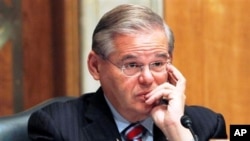Experts testifying in front of a U.S. Senate Foreign Relations Committee panel agree that Latin America is more democratic today that it has ever been in the past, and say that democratic institutions and the democratic transfer of power have taken hold in the region over the past 30 years. But the experts say that Cuba is the one glaring exception, and cite Venezuela and Nicaragua as places of concern due to political pressure from the govenment on the opposition and on independent journalists.
The experts testifying to a Senate subcommittee all agreed that there is plenty of good news on the state of democracy in Latin America.
"Latin America has never been as democratic as it is today. With one noteable exception, Cuba, every country enjoys formally democratic government," said Micheal Reid of the Economist magazine.
Reid and other experts said that across Latin American more citizens are participating in government today, in part due to increasing economic prosperity, and that there is a broad acceptance of elections as the way to transfer power.
Senate Foreign Relations Subcommittee Chairman, Democratic Senator Robert Menendez of New Jersey, agreed, singling out three countries for particular praise.
"Brazil, Chile and Uruguay have made great strides in the quality of democracy over the past 30 years," Menendez said.
But the experts at the hearing said challenges remain, citing Cuba as an exception to the trend, with the Communist island courntry still undemocratic, and its people still not free. State Department Deputy Assistant Secretary for the Western Hemisphere, Roberta Jacobson, singled out Venezuela and Nicaragua for concern.
"We are particularly concerned about Venezuela as President Chavez continues to disrespect the legitimate fole of democratic institutions, restrict freedom, including by closing press outlets and use the judiciary to persecute political opponents," Jacobson said.
Republican Senator Marco Rubio of Florida has harsher words for Venezuelan President Hugo Chavez, calling him a "clown" who he said has visions of grandeur but Rubio said his influence in Latin America has actually decreased in recent years.
"More importantly I feel sorry for the people of Venezuela because he is an embarassment to that country, a people that are a proud people, a people with a tremendous amount of potential, a country with a tremendous amount of wealth, really a nation that has an opportunity to be a leader in the world," Rubio said.
Roberta Jacobson of the State Department said that the govenment of Nicaragua has manipulated the courts and congress to concentrate power in the executive branch.
The experts at the hearing also warned, that in other countries in Latin America where the governments are democratic, such as Mexico, crime and drug cartels pose the greatest danger to safety and freedom. Outside of war zones, Latin America is the most violent region on Earth.




